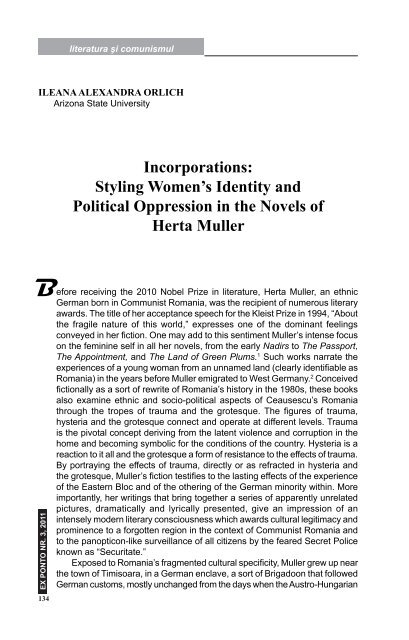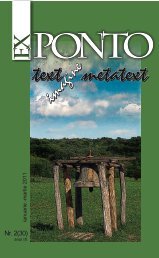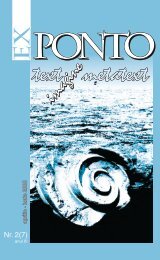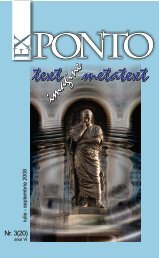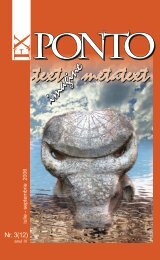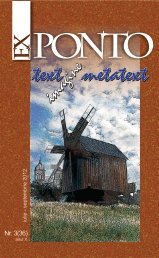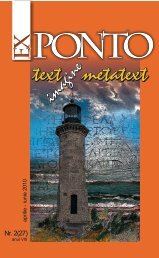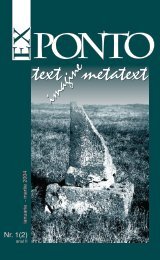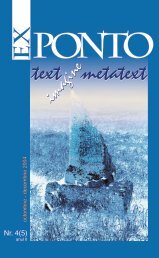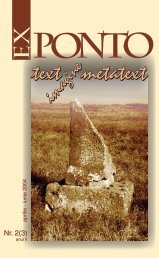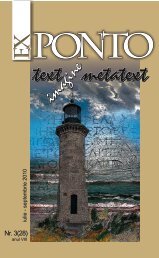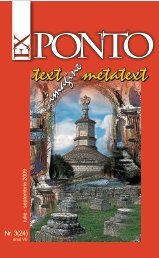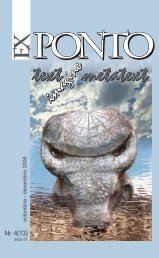Nr. 3 (32) anul IX / iulie-septembrie 2011 - ROMDIDAC
Nr. 3 (32) anul IX / iulie-septembrie 2011 - ROMDIDAC
Nr. 3 (32) anul IX / iulie-septembrie 2011 - ROMDIDAC
You also want an ePaper? Increase the reach of your titles
YUMPU automatically turns print PDFs into web optimized ePapers that Google loves.
literatura şi comunismul<br />
ILEANA ALEXANDRA ORLICH<br />
Arizona State University<br />
Incorporations:<br />
Styling Women’s Identity and<br />
Political Oppression in the Novels of<br />
Herta Muller<br />
B<br />
Ex Ponto nr. 3, <strong>2011</strong><br />
134<br />
efore receiving the 2010 Nobel Prize in literature, Herta Muller, an ethnic<br />
German born in Communist Romania, was the recipient of numerous literary<br />
awards. The title of her acceptance speech for the Kleist Prize in 1994, “About<br />
the fragile nature of this world,” expresses one of the dominant feelings<br />
conveyed in her fiction. One may add to this sentiment Muller’s intense focus<br />
on the feminine self in all her novels, from the early Nadirs to The Passport,<br />
The Appointment, and The Land of Green Plums. 1 Such works narrate the<br />
experiences of a young woman from an unnamed land (clearly identifiable as<br />
Romania) in the years before Muller emigrated to West Germany. 2 Conceived<br />
fictionally as a sort of rewrite of Romania’s history in the 1980s, these books<br />
also examine ethnic and socio-political aspects of Ceausescu’s Romania<br />
through the tropes of trauma and the grotesque. The figures of trauma,<br />
hysteria and the grotesque connect and operate at different levels. Trauma<br />
is the pivotal concept deriving from the latent violence and corruption in the<br />
home and becoming symbolic for the conditions of the country. Hysteria is a<br />
reaction to it all and the grotesque a form of resistance to the effects of trauma.<br />
By portraying the effects of trauma, directly or as refracted in hysteria and<br />
the grotesque, Muller’s fiction testifies to the lasting effects of the experience<br />
of the Eastern Bloc and of the othering of the German minority within. More<br />
importantly, her writings that bring together a series of apparently unrelated<br />
pictures, dramatically and lyrically presented, give an impression of an<br />
intensely modern literary consciousness which awards cultural legitimacy and<br />
prominence to a forgotten region in the context of Communist Romania and<br />
to the panopticon-like surveillance of all citizens by the feared Secret Police<br />
known as “Securitate.”<br />
Exposed to Romania’s fragmented cultural specificity, Muller grew up near<br />
the town of Timisoara, in a German enclave, a sort of Brigadoon that followed<br />
German customs, mostly unchanged from the days when the Austro-Hungarian


